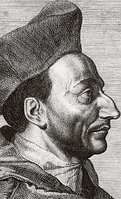Saint Charles Borromeo
 At the 10.30am Mass today, I mentioned that St Charles Borromeo was one of my favourite saints and that I would not try to say much about him otherwise the Mass would not be over in time for lunch. Here is the text of a sermon that I preached on 9 July (the 14th Sunday of the Year) during a series of sermons on the saints.
At the 10.30am Mass today, I mentioned that St Charles Borromeo was one of my favourite saints and that I would not try to say much about him otherwise the Mass would not be over in time for lunch. Here is the text of a sermon that I preached on 9 July (the 14th Sunday of the Year) during a series of sermons on the saints.Whether they listen or not, this set of rebels shall know there is a prophet among them. (Ezekiel 2.5)
The mid-16th century was a time when there was much corruption in the Church. There was widespread financial scandal because people were made abbots, bishops or rectors of parishes simply in order to take the revenues of an institution without ever living there or doing any pastoral work. Many priests lived bad lives, openly breaking their vow of celibacy, not saying Mass, not instructing the people. The education of the clergy was poor in many places. These scandals helped to add fuel to the protestant reformation. The Council of Trent re-stated Catholic doctrine but also, and just as importantly, made a great number of decrees to reform the life of Bishops and priests.
St Charles Borromeo was from a noble family, the nephew of Angelo de Medici who became Pope Pius IV in 1560. He was made an abbot at the age of 12, and a Cardinal at the age of 22 – just the kinds of abuses that the Council of Trent was in the process of reforming. However, when he was made the Archbishiop of Milan at the age of 25, he showed his determination not to perpetuate these abuses.
From the beginning, he lived a holy life and set about implementing in the Diocese of Milan the reforms required by the Council of Trent. On his indefatigable round of visitations, he was unflinching in his demand that the clergy and religious should adopt a proper way of life befitting their state. He asserted the rights of the Church, restored his Cathedral to being a place of worship and – a surprise to the people of that time – lived at the Cathedral and preached the faith to the people.
Where he faced obstinate opposition, he imposed the penalty of excommunication if necessary. His action caused such anger that on one occasion, a friar of the umiliati whom he had ordered to reform their way of life attempted to assassinate him. Fortunately, gun technology was not terribly advanced and a pellet pierced his rochet but did not injure him. The effect of the incident was to convince people that St Charles' life had been miraculously preserved.
His work for the universal Church was also crucial. He knew the decrees of the Council of Trent off by heart (no mean feat) and he was a key figure in the reform of the Breviary and the Roman Missal. He set a model in establishing proper conduct for the hearing of confessions – requiring the use of a confessional in the Church with a fixed grille to avoid any suggestion of scandal. He also promoted reverence for the Blessed Sacrament, encouraging the relatively new 40 hours devotion and arranging that the Blessed Sacrament should be reserved in a fitting tabernacle on the High Altar.
His motto was humilitas. Although he used the trappings of his office when necessary for the good of the Church, his personal life was austere and his household had the character of a religious community. He offered generous hospitality to visiting priests. On one occasion, his guests were some of the English priests recently ordained from the new English College in Rome; they were on their way back to England to be martyred.
He showed constant generosity to the poor, often running into personal debt as a result. During an outbreak of the plague in Milan, he fearlessly stayed in the town so that he could visit the sick. When going visiting around the city, he carried a ladder on his carriage so that if a house was boarded up because of the plague, he could climb up and enter through an upstairs window.
The life of St Charles teaches us the importance of fidelity to the teaching of the Church combined with holiness of life. In the Church, reform and renewal is not accomplished by making a break with the past or by revolutionary changes. Our Holy Father Pope Benedict has spoken of how we should interpret the second Vatican Council of the 1960s in terms of continuity and reform, not of a discontinuity and rupture with the past.
Fidelity to the Church and holiness are the means by which genuine renewal and reform is brought about in the Church in every age.
